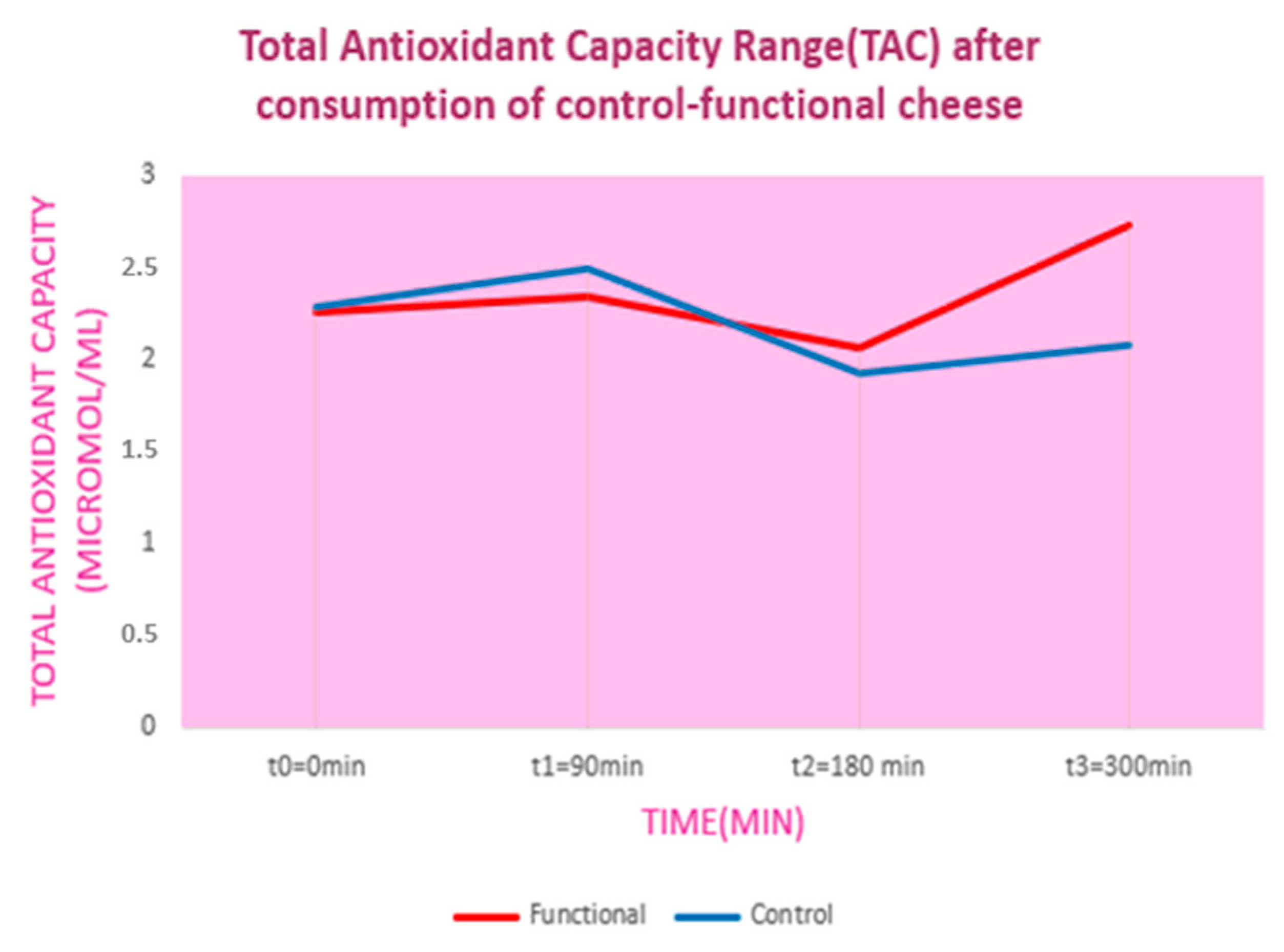Postprandial Bioactivity of Spread Cheese, Enhanced with Mountain Tea and Orange Peel Extract, in Healthy Volunteers. A Pilot Study †
Abstract
:1. Introduction
2. Materials and Methods
Preparation of the Novel Spread Cheese
3. Results and Discussion

4. Conclusions
Funding
Institutional Review Board Statement
Informed Consent Statement
Data Availability Statement
Conflicts of Interest
References
- Diekmann, C.; Huber, H.; Preu, M.; Preu, P.; Predel, H.D.; Stoffel-Wagner, B.; Fimmers, R.; Stehle, P.; Egert, S. Moderate Postmeal Walking Has No Beneficial Effects Over Resting on Postprandial Lipemia, Glycemia, Insulinemia, and Selected Oxidative and Inflammatory Parameters in Older Adults with a Cardiovascular Disease Risk Phenotype: A Randomized Crossover Trial. J. Nutr. 2019, 149, 1930–1941. [Google Scholar] [CrossRef] [PubMed]
- Le, N.A. Postprandial Triglycerides, Oxidative Stress, and Inflammation in Triglycerides and Cholesterol. Available online: https://www.intechopen.com/books/apolipoproteins-triglycerides-and-cholesterol/postprandial-triglycerides-oxidative-stress-and-inflammation (accessed on 25 June 2020).
- Koutelidakis, A.Ε.; Rallidis, L.; Koniari, K.; Panagiotakos, D.; Komaitis, M.; Zampelas, A.; Anastasiou-Nana, M.; Kapsokefalou, M. Effect of green tea on postprandial antioxidant capacity, serum lipids, C Reactive Protein and glucose levels in patients with coronary artery disease. Eur. J. Nutr. 2013, 53, 479–486. [Google Scholar] [CrossRef] [PubMed]
- Dimina, L.; Mariotti, F. The Postprandial Appearance of Features of Cardiometabolic Risk: Acute Induction and Prevention by Nutrients and Other Dietary Substances. Nutrients 2019, 11, 1963. [Google Scholar] [CrossRef] [PubMed]
- Konstantinidi, M.; Koutelidakis, A.E. Functional Foods and Bioactive Compounds: A Review of Its Possible Role on Weight Management and Obesity’s Metabolic Consequences. Medicines 2019, 6, 94. [Google Scholar] [CrossRef] [PubMed]
- Dimou, C.; Karantonis, C.; Skalkos, D.; Koutelidakis, A.E. Valorization of fruits by-products to unconventional sources of additives, oil, biomolecules and innovative functional foods. Curr. Pharm. Biotechnol. 2019, 20, 776–786. [Google Scholar] [CrossRef] [PubMed]
- Georgakopoulou, V.; Dimou, C.; Karantonis, C. In Vitro Antioxidant, Antithrombotic, Antiatherogenic and Antidiabetic Activities of Urtica dioica, Sideritis euboea and Cistus creticus Water Extracts and Investigation of Pasta Fortification with the Most Bioactive One. Curr. Pharm. Biotechnol. 2019, 20, 874–880. [Google Scholar]
Publisher’s Note: MDPI stays neutral with regard to jurisdictional claims in published maps and institutional affiliations. |
© 2020 by the authors. Licensee MDPI, Basel, Switzerland. This article is an open access article distributed under the terms and conditions of the Creative Commons Attribution (CC BY) license (https://creativecommons.org/licenses/by/4.0/).
Share and Cite
Papagianni, O.; Loukas, T.; Magkoutis, A.; Biagki, T.; Dimou, C.; Karantonis, C.; Koutelidakis, A. Postprandial Bioactivity of Spread Cheese, Enhanced with Mountain Tea and Orange Peel Extract, in Healthy Volunteers. A Pilot Study. Proceedings 2021, 70, 19. https://doi.org/10.3390/foods_2020-07671
Papagianni O, Loukas T, Magkoutis A, Biagki T, Dimou C, Karantonis C, Koutelidakis A. Postprandial Bioactivity of Spread Cheese, Enhanced with Mountain Tea and Orange Peel Extract, in Healthy Volunteers. A Pilot Study. Proceedings. 2021; 70(1):19. https://doi.org/10.3390/foods_2020-07671
Chicago/Turabian StylePapagianni, Olga, Thomas Loukas, Athanasios Magkoutis, Theodora Biagki, Charalampia Dimou, Charalampos Karantonis, and Antonios Koutelidakis. 2021. "Postprandial Bioactivity of Spread Cheese, Enhanced with Mountain Tea and Orange Peel Extract, in Healthy Volunteers. A Pilot Study" Proceedings 70, no. 1: 19. https://doi.org/10.3390/foods_2020-07671
APA StylePapagianni, O., Loukas, T., Magkoutis, A., Biagki, T., Dimou, C., Karantonis, C., & Koutelidakis, A. (2021). Postprandial Bioactivity of Spread Cheese, Enhanced with Mountain Tea and Orange Peel Extract, in Healthy Volunteers. A Pilot Study. Proceedings, 70(1), 19. https://doi.org/10.3390/foods_2020-07671







